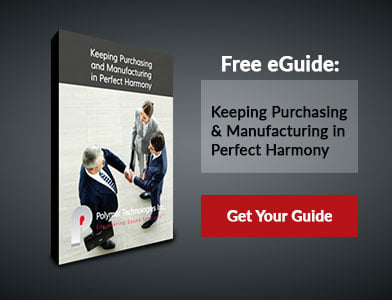What is overmolding?
Overmolding is the process of using a foam application to mold over a tube, pipe, or piece of metal. The process has the capability to change the aesthetics and performance of a piece of equipment. While its primary application is to provide a clean, textured finish to an application, overmolding can also be used to address heat and noise concerns that may come up. The versatility and range of applications make the overmolding process a vital part of the manufacturing process. Though it is a relatively common process (for example, you may see overmolding on the handles of a pair of pliers), overmolding has many applications that are more complex and demanding.
Read More
Topics:
manufacturing,
overmolding
What is RoHS Compliance?
RoHS, which stands for the Restriction of Hazardous Substances Directive, is a European Union directive restricting the use of specific hazardous substances in certain electronic and electrical equipment. These substances are considered hazardous to the environment and are particularly dangerous in terms of occupational exposure during the manufacture and recycling stages of equipment. With its implementation on July 1, 2006, the directive restricts the use of the use of the following substances:
Read More
Topics:
Compliance,
RoHS
A lot of effort goes into creating any kind of medical device, and the approval process is often long. Naturally, a significant part of a manufacturer’s focus is on making sure the device works and complies with safety standards. However, comfort should also be at the top of your list of concerns when designing devices that enable patients to monitor and maintain their health. If a product is made for home use, part of its effectiveness is ensuring that patients will actually use it, and if they find it cumbersome and inconvenient, they may not.
Read More
Topics:
medical devices,
comfort,
manufacturing
Manufacturers often run into situations where they are dealing with extraordinarily high temperatures. Depending on the specific attributes of the situation, these temperatures can have a dramatic effect on the performance, safety, and longevity of a piece of equipment. Materials can quickly break down when exposed to high temperature or prolonged heat exposure. Choosing the right materials, then, to handle a high temperature situation becomes critically important not only in terms of the usability of the machinery but also the safety and durability of the machinery. Sometimes operators or components need to be kept at very stable temperatures such as within walls and HVAC ducts. In other instances, high temperatures are simply a function of the machinery itself as with fuselages, gas tanks, and exhaust pipes, and need to be managed accordingly.
Read More
Topics:
Flammability
UL 94 is a plastics flammability standard, also known as the Standard of Flammability of Plastic Materials for Parts. This standard was released by Underwriters Laboratories (UL) to classify plastics based on how they burn, with orientation and thickness level determining a plastic’s tendency to extinguish or spread the flame once ignited, and how well the material resists ignition.
Read More
Topics:
Flammability,
Insulation
The AS9100 Quality Management System (QMS) belongs to a family of standards designed to address diverse quality requirements while also reducing supply chain costs throughout the international aerospace industry. Products such as aircraft insulation materials bring a high level of quality and trust when backed by a business with AS9100 certification.
Read More
Topics:
Insulation,
aerospace,
acoustic concerns
Noise and vibration production is a major problem encountered by companies that utilize appliances in their workspaces. Appliances that produce significant vibrations can include any and all products with mechanical parts—generators, kitchen appliances like blenders, offices appliances like printers, and so on. Vibration is distracting, uncomfortable, and in some cases, unsafe for workers. It is one of the most common reasons companies will come back to manufacturers with complaints or request changes to the design.
Read More
Topics:
appliance vibration,
noise and vibration,
acoustic concerns
Driving a truck has never been viewed as an easy, as it involves long hours, unconventional sleep patterns, and lengthy periods of time on the road and away from home. However, not only is it a stable, well-paying, blue-collar career, but it’s necessary for businesses and the economy to operate as they do. While the primary function of these trucks is to transport cargo from point A to point B, the comfort of drivers should always be kept in mind when designing and manufacturing truck cabins.
Read More
Topics:
heavy trucking,
tractor trailer,
truck cab,
semi-truck
For years, fiberglass has been used as the industry standard for insulation in heating and cooling systems, despite being a possible detriment to the environment and known to have potential for adverse health effects. Over time fiberglass insulation can deteriorate and migrate through supply diffusers, which are used to evenly distribute and deliver air throughout a house or building. In turn this can lead to the deteriorated fiberglass liner getting deposited throughout your home or building.
Read More
Topics:
Insulation,
closed cell foam,
fiberglass insulation
To save costs and lessen pollution, many trucking companies are making the switch from diesel to natural gas. Accordingly, there is a growing prevalence of fueling stations for trucks that use natural gas. These fueling stations can get extremely loud, and it is therefore important to implement the most effective noise control system to enhance comfort for truckers filling their tanks.
Polymer worked with a manufacturer of natural gas refueling pumps that was experiencing problems with noise reduction materials and associated assembly and installation that weren’t cost-effective for the company. Additionally, installing the company’s existing noise control materials created negative conditions for workers. Polymer found the client a solution by analyzing their materials and processes and developing a customized system that was more efficient.
Read More
Topics:
gas pumps,
natural gas pumps,
noise damping











